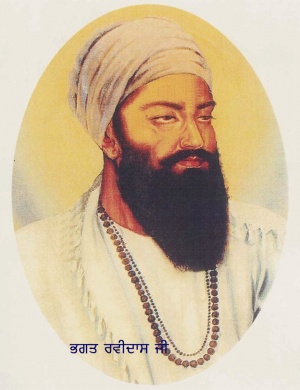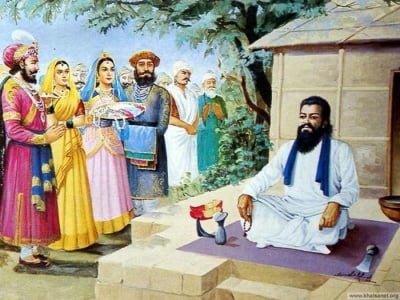Bhagat Ravidas
Bhagat Ravidas was born on Maghshudhi 14 Pooranmashi in Smt.1456, i.e., February 1399 in Kashi. His parents were in the leather trade, and were very well off. He was barely five days old when Bhagat Ramanand visited his house and blessed the child. Ravidas was a poet and mystic, was born to Raghu and Ghurbinia, who lived near the city of Varanasi.
By the turn of fourteenth century, the Muslim rule had comfortably established in India. When Bhagat Ramanand (1366-1467 AD) came to Northern India and made Kashi/Benares as his home, he noted that the Muslim religion had penetrated; a considerable number of Hindus had been converted, and they had adopted Islam as their religion. Ramanand was an orthodox devotee of Shiva. He was, no doubt, impressed with the Islamic theory of Oneness of God and Feeling of Equality in social set up; except Ruling Feudal Elite, the Muslims of all classes mingled indistinctively in every aspect of life--living, eating, religious ceremonies, marriages, etc. But he was very much distressed to observe that these criteria were enhancing the conversion of Hindus, particularly of low-caste, into Islam. He forsook the Shivaite austere practices endowed to him by his Guru, Ramanuj, and initiated the veneration of the Universal Brotherhood. He accepted Hindus of low-castes and Muslims to join him in worship, and become his followers. Among his most noted disciples were Kabir--a Muslim weaver, Sain--a barber, Dhanna--a cultivator, and Ravidas--a cobbler.
When Ravidas reached the age of discretion his father inspired him to join the family business. But Ravidas was imbued with celestial and humane values. The money he received from his father for business, he spent in the welfare of the Saints and needy. His father was extremely perturbed and banished him from the house. By this time Ravidas was already married. He did not resent, quietly left the house, started living in a make-shift hut with his wife, and set up a small wayside shop for mending shoes.
He did not abandon his love for the God and built a Temple of clay-walls and thatched roof. He installed an idol made out of hide in the Temple. His extreme devotion and universal love induced hundreds of people of all castes to join him in worship. This resulted in enviousness among the Brahmin priests who raised the matter in the Court of Muslim Nawab of Kashi. The Nawab was a man of righteousness, and put the matter in a miraculous test. Bhagat Ravidas went into meditation and recited one of his hymns (Gauri Purbi P.346) and requested Almighty, "Take pity on me that my doubts may be dispelled." His prayer was answered, and his adoration acclaimed the triumph in the miraculous test. To express his gratitude he sang his hymn (Asa P.1606), "Thou art sandal and I am the poor castor-plant, dwelling close to thee. From a mean tree I have become sublime and Thine fragrance, exquisite fragrance, now, abides in me."
A rich man tried to allure him with the charm of wealth. He gave the Bhagat a philosopher's stone by the touch of which one could change any article into gold. In spite of Bhagat's refusal the rich man left the stone hung under the ceiling. When he came back after one year the stone was still hanging there. The rich man announced to the world the indisputable godliness of Bhagat Ravidas. This episode is considered to be an ecclesiastic test to judge Bhagat Ravidas's endurance towards the worldly love. But some accounts associate this to the devious manipulation of the Brahmin priests to discredit Ravidas, which, rather, ended in the triumph of the Bhagat.
Ravidas's selfless devotion and casteless love for humanity spread far and wide. Maharani Jhally of Chitaur' was a noble woman of benevolence and piety. Her ardency brought her to Benares on a pilgrimage. In spite of the disapproval of the Brahmin priests, she straight-away went to the Temple of Bhagat Ravidas. Ravidas was in his ecclesiastic benediction at the time, and was reciting his hymns (Rag Sorath P.658-59). Maharani was captivated. Eventually she became his disciple and abandoned all her luxurious set up. Her husband, the Maharana, had been instigated against her adopting a cobbler as her Guru. He was full of rage when she returned. He was pacified by listening to some of the hymns of Bhagat Ravidas but still wanted to put the Bhagat through a test to invalidate the allegations of the Brahmins. The Bhagat was invited to Chitaur and requested to participate in an oblation. The Brahmin priests refused to eat while a cobbler was seated in the same column of rows. Bhagat Ravidas voluntarily moved away. But miraculously every person distributing food looked like Bhagat Ravidas to the Brahmins (Another account states when the Brahmins sat down to eat, they saw Ravidas seated between every two of them). They complained to Maharana. Maharana perceived the hidden meaning of this marvel, and himself became an ardent devotee. Bhagat Ravidas remained in Chitaur for a long time. It is said that Mira Bai became his disciple as well during that period. As per some accounts he died at a ripe old age of nearly 120 years in Benares.
There are 41 verses of Bhagat Ravidas in the Sikh holy book, Guru Granth Sahib. Most of them are in very clear Hindi. His poetry is brimming with ardent love for God, Universe, Nature, Guru, and the Name. His sarcasm and pique shows his closeness with God.
Untouchability
He was the first to motivate his followers to challenge discrimination on the grounds of caste. Because of his charismatic deeds, he has become an important figure in the Whole World, his followers calling themselves Ravidasis. He was the first to motivate his followers to make/call them untouchables who make/call them so. By his deeds he proved that he was a high caste, although others were calling him a low caste. He was the first to scientifically prove the highness of his caste.
[edit] Devotional songs
His devotional songs and verses made a lasting impact in the Bhakti movement.
अब कैसे छूटे राम, नाम रट लागी |
पढ़रभढ़जी तढ़म चनढ़दन हम पानी, जाकी अंग अंग बास समानि |
पढ़रभढ़जी तढ़म घन बन हम मोरा, जैसे चितवत चनढ़द चकोरा |
पढ़रभढ़जी तढ़म दीपक हम बाती, जाकी जोति बरै दिन राती |
पढ़रभढ़जी तढ़म मोती हम धागा, जैसे सोने मिलत सढ़हागा |
पढ़रभढ़जी तढ़म सढ़वामी हम दासा, झसी भकढ़ति करै रैदासा |
Translation:
How to escape? I recite the name Ram.
Lord, if you are sandalwood, I am water;
with the fragrance in all parts of my body.
Lord, if you are a cloud, I am a peacock;
looking for you like a chakora for the moon.
Lord, if you are a lamp, I am the wick (bAti);
with the light burning day and night.
Lord, if you are a pearl, I am the thread;
together like gold and suhaga.
Lord, you are the master and I servant;
thus is the devotion of Raidas.
Forty-one of his writings have been included in the Sikh Holy Book Guru Granth Sahib. There is also a larger body of hymns passed on independently of the Guru Granth Sahib.
Guru Ravidas is venerated in northern India, and in the Indian state of Maharashtra, in particular by the Ravidasi religion. The movement gained an extra impetus in 1920 in Punjab, due to Sikh members of the Chamar caste rebelling against continued caste oppression aimed at them. This group split from the Sikh community and joined the Ravidasi faith en-masse. Today, former Chamars from the Punjab are the largest visible ethnic group in the Ravidasi community. Punjabi Ravidasis have a number of Gurdeheras in the United Kingdom, especially in the Midlands.
Legend of Ravidas Today
Today, Bhagat Ravidas is very respected Hindu reformers. BJP Scheduled Caste Morcha president Bangaru Laxman (Organiser, 6-8-1995) accused Congress leader Sitaram Kesri, who had bracketed the Dalits with the minorities as "sufferers of Hindu oppression", of thereby showing "disrespect to Dalit saints like Ravidas, Satyakam Jabali, Sadhna Kasai, Banka Mahar, Dhanna Chamar and others who protected Hindus against foreign onslaughts."
| These are the 15 Bhagats of Sikhism |
|
Bhagat Beni | Bhagat Bhikhan | Bhagat Dhanna | Sheikh Farid | Bhagat Jaidev | Bhagat Kabir | Bhagat Namdev | Bhagat Parmanand | Bhagat Pipa | Bhagat Ramanand | Bhagat Ravidas | Bhagat Sadhna | Bhagat Sain | Bhagat Surdas | Bhagat Trilochan |


